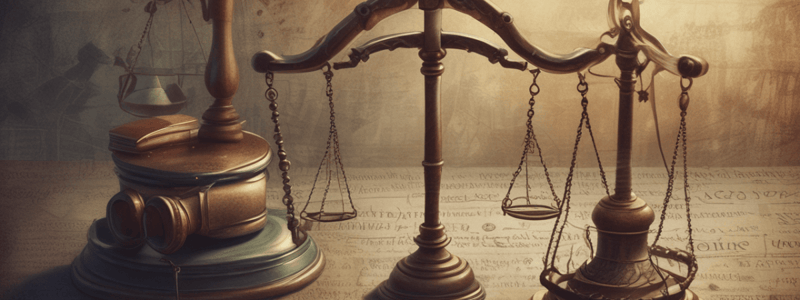Podcast
Questions and Answers
What is the primary focus of the first semester oral exam in the Restorative Justice course?
What is the primary focus of the first semester oral exam in the Restorative Justice course?
- Lectures, online handouts, and one reading of choice from the materials in BB (correct)
- Optional exercises and research papers
- Reading books and submitting a thesis
- Restorative Dialogues with inmates in Opera prison
What is the main objective of Restorative Justice, according to Gerald Haddad's concept?
What is the main objective of Restorative Justice, according to Gerald Haddad's concept?
- To create divisions and conflict between groups
- To challenge the other and assert one's own rights
- To punish the offender and protect society
- To live well with others, including the 'brotherhood' relationships (correct)
What is the significance of the Israel vs. Palestine example in the context of Restorative Justice?
What is the significance of the Israel vs. Palestine example in the context of Restorative Justice?
- It demonstrates the success of Restorative Justice in resolving conflicts
- It illustrates the role of apartheid in promoting peace and reconciliation
- It highlights the division and conflict created by competing claims to the same land (correct)
- It shows the importance of claiming land as one's own in conflict resolution
What is the role of men and women who create peace in conflict situations, according to the concept of Restorative Justice?
What is the role of men and women who create peace in conflict situations, according to the concept of Restorative Justice?
What is the significance of the phrase 'shake the hand of the person who killed your son' in the context of Restorative Justice?
What is the significance of the phrase 'shake the hand of the person who killed your son' in the context of Restorative Justice?
What is the main difference between the Restorative Justice approach and traditional justice systems?
What is the main difference between the Restorative Justice approach and traditional justice systems?
What is the role of 'bridges' in the context of Restorative Justice?
What is the role of 'bridges' in the context of Restorative Justice?
What is the significance of the South Africa example in the context of Restorative Justice?
What is the significance of the South Africa example in the context of Restorative Justice?
What is the main significance of Alexander Langer's Decalogue for Inter-ethnic Coexistence?
What is the main significance of Alexander Langer's Decalogue for Inter-ethnic Coexistence?
What is the primary focus of retributive justice?
What is the primary focus of retributive justice?
What is the significance of the Code of Hammurabi in the context of retributive justice?
What is the significance of the Code of Hammurabi in the context of retributive justice?
What is the principle that describes the adversarial process where one party accuses and the other defends?
What is the principle that describes the adversarial process where one party accuses and the other defends?
According to Hanna Arendt, what is the limitation of punishment in the context of retributive justice?
According to Hanna Arendt, what is the limitation of punishment in the context of retributive justice?
In the adversarial method, who has the power to decide on the parties to the dispute?
In the adversarial method, who has the power to decide on the parties to the dispute?
What is the significance of the International Criminal Court in the context of retributive justice?
What is the significance of the International Criminal Court in the context of retributive justice?
What is the principle that describes the exchange of concessions in transactional negotiation methods?
What is the principle that describes the exchange of concessions in transactional negotiation methods?
What is the characteristic of the third party in responsive restorative methods?
What is the characteristic of the third party in responsive restorative methods?
What is the primary weakness of retributive justice, according to the text?
What is the primary weakness of retributive justice, according to the text?
What is the primary goal of transactional negotiation methods?
What is the primary goal of transactional negotiation methods?
What is the significance of the Criminological Museum in Rome, according to the text?
What is the significance of the Criminological Museum in Rome, according to the text?
What is the characteristic of responsive restorative methods?
What is the characteristic of responsive restorative methods?
What is the significance of the US ban on certain practices related to the death penalty, according to the text?
What is the significance of the US ban on certain practices related to the death penalty, according to the text?
What is the consequence of not reaching an agreement in transactional negotiation methods?
What is the consequence of not reaching an agreement in transactional negotiation methods?
What is the philosophy behind the adversarial method, as described by Immanuel Kant?
What is the philosophy behind the adversarial method, as described by Immanuel Kant?
What is the primary focus of the coercive logic in court?
What is the primary focus of the coercive logic in court?
Which of the following is a key objective of the Directive?
Which of the following is a key objective of the Directive?
What is the primary challenge in implementing the 'information' aspect of the Directive?
What is the primary challenge in implementing the 'information' aspect of the Directive?
When must assistance services be guaranteed for victims?
When must assistance services be guaranteed for victims?
What is the primary goal of the 'protection' aspect of the Directive?
What is the primary goal of the 'protection' aspect of the Directive?
What is a key characteristic of the 'participation in the criminal process' aspect of the Directive?
What is a key characteristic of the 'participation in the criminal process' aspect of the Directive?
What is the primary purpose of the statute established by the Kampala Conference regarding victims and witnesses?
What is the primary purpose of the statute established by the Kampala Conference regarding victims and witnesses?
Who are the victims addressed by the Directive, in addition to those dependent on criminal proceedings?
Who are the victims addressed by the Directive, in addition to those dependent on criminal proceedings?
What is the current status of the 'participation in the criminal process' aspect of the Directive?
What is the current status of the 'participation in the criminal process' aspect of the Directive?
According to Article 85, what is a key characteristic of natural persons who are considered victims?
According to Article 85, what is a key characteristic of natural persons who are considered victims?
Which type of organisation or institution can be considered a victim under the statute?
Which type of organisation or institution can be considered a victim under the statute?
What is one of the ways in which victims can participate in the legal process?
What is one of the ways in which victims can participate in the legal process?
What is the primary purpose of the fund established by the Court for victims?
What is the primary purpose of the fund established by the Court for victims?
What is restorative justice, as described in the Council of Europe Declaration?
What is restorative justice, as described in the Council of Europe Declaration?
What is recommended by the Council of Europe Declaration in terms of restorative justice?
What is recommended by the Council of Europe Declaration in terms of restorative justice?
What is one example of an informal system in dispute resolution mentioned in the Council of Europe Declaration?
What is one example of an informal system in dispute resolution mentioned in the Council of Europe Declaration?
Flashcards are hidden until you start studying
Study Notes
Introduction to Restorative Justice
- Restorative justice is an experience, a different way of doing justice, through the encounter with the other who creates conflict.
- It involves creating "bridges" between people who have been divided by conflict, violence, and hatred.
- Mediators, bridge-builders, and point and border jumpers are essential in creating communication with the other.
Models of Justice
- Retributive (or absolute) justice: the evil of a crime is repaid with the same 'blow', responding to evil with evil.
- Retributive justice is cross-cultural and aims to punish the offender, but it can lead to cruelty and revenge.
- The recognition of cruelty in doing justice is a progressive and slow recognition that depends on social sensitivity, culture, and juridical elaboration.
Types of Justice Systems
- Retributive justice: focuses on punishment and retribution, with an adversarial principle, where the judge has the power to decide.
- Transactional negotiation methods: involves agreements reached through exchange and negotiation, where the parties involved have the power to resolve the dispute.
- Responsive restorative methods: a participatory, dialogic, and constructive approach, where mediators facilitate the meeting and recognition of the parties involved.
Victims' Rights
- The Directive on victims' rights aims to ensure information, assistance, and protection, regardless of criminal investigation or prosecution.
- The Directive offers victims the opportunity to participate in criminal proceedings.
- Victims have the right to participate, intervene, have legal representation, and seek reparation in case of conviction of the accused.
Restorative Justice in International Standards
- Restorative justice is considered a victim-friendly instrument, recommended by international standards, such as the Council of Europe Declaration (1985).
Studying That Suits You
Use AI to generate personalized quizzes and flashcards to suit your learning preferences.




